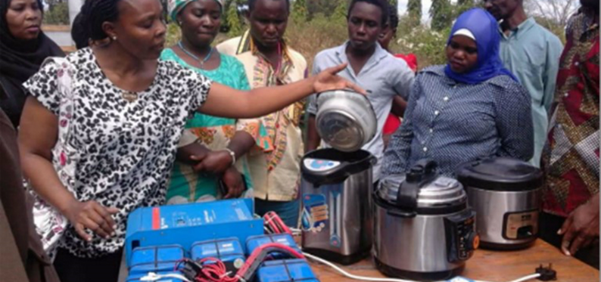The pollution caused by using fuels such as these is responsible for around four million deaths each year – primarily women and children.
With the COVID-19 pandemic thought to increase people’s vulnerability to pre-existing lung disease, it is hoped that the Modern Energy Cooking Services (MECS) Electric Cooking Outreach (ECO) challenge fund will help increase the transition towards cleaner cooking worldwide.
The focus for the challenge fund was on electric cooking appliances – in particular pressure cookers – and their acceptance to both users and those managing the delivery of grid and off-grid electricity.
The 14 successful applicants, who will receive sums of up to £60,000 each, are based across nine countries in Africa (Kenya, Rwanda Tanzania, Uganda and Zambia) and Asia (Bangladesh, Cambodia, Myanmar and Nepal).
They include projects such as iDE (International Development Enterprises) – a community pilot based in Cambodia, aimed at learning more about attitudes and perceptions around cooking in rural areas.
Loughborough’s Professor Ed Brown, MECS Research Director, said: “It is incredibly exciting to see that there will be such a wide range of deployments of efficient electrical cooking devices into a diversity of country contexts over the coming months.
“These projects will give us a great deal of new data on how consumers in different countries cook with electric pressure cookers (EPCs), what they like and what they don't like about the experience of cooking with the EPC, and the relative cost of using them in relation to what they would normally spend on cooking with other fuels.
“These comparative experiences will be an invaluable source of learning for the programme as we continue to build the evidence base for an accelerated transition to modern energy cooking.”

The competition centred on two themes:
Theme 1: Community-scale pilots - awarded up to £60,000 each with projects to run for twelve months
- Focus on whether commercially available efficient electrical cooking appliances fit the cultural cooking processes and electricity supply for a given market
Theme 2: Market assessments – awarded up to £30,000 with project duration six months
- Focus on providing market intelligence on the emerging opportunities for efficient electrical cooking appliances in DfID (Department for International Development) priority countries
Other winners included Pereybere Energy – a Kenya based start-up focused on social economic development through smart energy services.
Co-founder Charles Kagiri said: “The MECS ECO challenge fund is a great platform for Pereybere Energy to contribute to the global effort to minimize the harm done by cooking with polluting fuels.
“We are excited to take part and positively change the perception of electric cooking among newly electrified rural homes with the introduction of electric pressure cookers (EPCs). This will help raise the living standard in these communities and increase revenue to the utility, which will improve the sustainability of the grid.”
The MECS ECO challenge fund forms a core component of the £39.8 million MECS programme, funded by UK Aid and jointly managed by Loughborough University and the World Bank’s Energy Sector Management Assistance Programme (ESMAP).
Several more rounds of the challenge fund will be run, with the next due to be announced by the end of the year.
The competitions are open to companies of all sizes, as well as academia and other organisations, to support research projects which could lead to enabling a safe and efficient modern energy cooking system.
Keep up to date with the ECO challenge via the MECS website and social media.
ENDS
